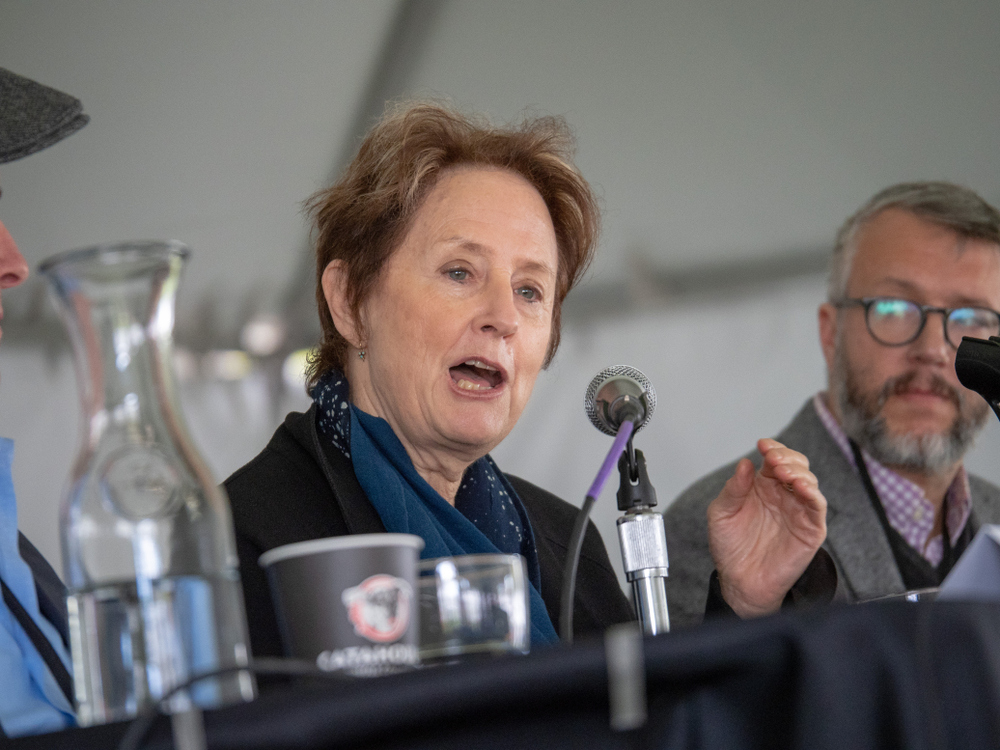Happy 50th Birthday to the Berkeley Restaurant that Launched Farm-to-Fork Eating
Chez Panisse oriented fine dining toward primary ingredients.
Happy 50th Birthday to the Berkeley Restaurant that Launched Farm-to-Fork Eating
Chez Panisse oriented fine dining toward primary ingredients.

The entrance to Chez Panisse in Berkeley, California.Calton/Wikipedia, CC BY-SA
This article is republished from The Conversation under a Creative Commons license. Read the original article.
When a small restaurant called Chez Panisse opened its doors 50 years ago in Berkeley, California, it wasn’t obvious that it would change how Americans thought about eating. The first menu on Aug. 28, 1971, was pâté baked in pastry, duck with olives, a salad and an almond tart, served for a fixed price of $3.95. There were too many waiters and not enough utensils.
But this seemingly quirky eatery’s food was more vivid and flavorful than that of French restaurants that were more elegant and expensive. Alice Waters, who founded and still runs Chez Panisse, didn’t invent gourmet food; as I write in my book Ten Restaurants that Changed America, her great innovation was to orient fine dining toward primary ingredients.
Today, Americans value local, seasonal and artisanal products on restaurant menus and at the market. The importance of starting with good-quality ingredients seems so obvious that it’s hard to understand why this was an alien idea 50 years ago.
Beyond French cuisine
Despite some grumbling about tasteless tomatoes, restaurant diners and shoppers in the 1970s cared primarily about low prices and the availability of a variety of products regardless of season. Where food came from and even what it tasted like were less important.
In 1970, the food writer Mimi Sheraton commented, “You can’t buy an unwaxed cucumber in this country … we buy over-tenderized meat and frozen chicken … food is marketed and grown for the purpose of appearances.”
At that time, high-end dining was still defined, as it had been for 300 years, by France. There, basic products such as chickens from Bresse, oysters from Belon or saffron from Quercy were exemplary and sought-after. Elsewhere, imitators were more preoccupied with sauces, technique and fashion than with what actually went into their dishes.
Even if chefs wanted better raw materials, the industrialization of US agriculture and livestock production made them difficult or impossible to find. Dining at the Pavillon, a 1962 book about New York’s Le Pavillon, quoted its notoriously arrogant owner, Henri Soulé, ruefully observing that he was unable to obtain things that the ordinary French shopper took for granted: young partridges, primeurs (early spring vegetables), Mediterranean fish like red mullet or rascasse and properly aged cheeses. In the United States, alas, “Everything is fresh all year round and is never quite fresh, if you see what I mean.”
Waters firmly believed that a restaurant could be no better than the ingredients it had to work with. But she struggled to find high-quality foods. Produce was the hardest, and attempts to create a farm run by the restaurant failed. Besides a few Chinese and Japanese markets, the restaurant had to depend on urban gardeners and foragers who knew where to find wild mushrooms and watercress. In 1989, Waters still found it challenging to obtain good butter, olives or prosciutto.
Chez Panisse’s menus were carefully faithful to French models in its early years. Then, between 1977 and 1983, the restaurant gradually shifted to what would become its focus: “California” or “New American” cuisine. Beef bourguignon and duck with olives were out; spicy crab pizza and warm goat cheese salad were in. As farmers and foragers realized there was a market for seasonal local products, they started producing for it – laying the foundation for today’s farm-to-table movement.

Driving a food movement
Many other California restaurants and chefs helped catalyze this revolutionary turn to local ingredients and an eclectic aesthetic. Chez Panisse alumni Mark Miller and Judy Rodgers went on to found new restaurants that explored beyond the modified Mediterranean aesthetic that inspired Waters. Another Chez Panisse veteran, Jeremiah Tower, created a more aggressively elegant cuisine at his San Francisco restaurant Stars.
But food historians acknowledge Alice Waters’ innovation, persistence and dedication. Joyce Goldstein commented in her 2013 book Inside the California Food Revolution: “I did not set out to write an encomium to Alice, but I’ve got to hand it to her, she drove the train of the ingredients revolution.”
Waters asserted from the start that food from a more local, small-scale agricultural system wouldn’t just taste better – it also would improve lives and human relations. She has been an activist for causes ranging from school food to sustainability to climate change – always drawing connections between better-tasting food and social and environmental healing.
And she has pushed back against skeptics who say that eating locally and organically is affordable only for a small elite. Her response is that access to affordable, decent food from sustainable sources should not depend on wealth or social privilege, any more than decent medical care should be available only to the affluent.
Chez Panisse has been startlingly consistent over its 50-year span. It is at the same address, and the menu is still limited on any given day but changes constantly. The focus on using only the best ingredients is as intense as ever. The meals I’ve eaten there, most recently in 2016, have all been marvelous.
Staying on track in a changing industry
As recent events have shown, restaurants aren’t utopias, however starry their aspirations. In 2017 and 2018 the industry was rocked by the #MeToo movement, which exposed abusive chefs and substandard wages at top-ranked organizations. Restaurants have also faced criticism for wasting food and perpetuating racial and economic inequality.
Restaurants are a historical cultural phenomenon rooted in bourgeois ambition. Expecting them to advance social justice may seem as naïve as expecting collective decision-making in a high-pressure food service environment where the ingrained response to whatever the boss says is “Yes, Chef.”
The nature of culinary celebrity is clearly changing. Against this background, the constancy of Alice Waters and Chez Panisse is all the more impressive. Few restaurants get to celebrate 50 years of service, let alone a half-century combining seriousness of social purpose, loose organizational hierarchy and, above all, simple and delightful food.
Paul Freedman is the Chester D. Tripp Professor of History at Yale University.
Follow us
This work is licensed under a Creative Commons Attribution-NoDerivatives 4.0 International License.
Want to republish a Modern Farmer story?
We are happy for Modern Farmer stories to be shared, and encourage you to republish our articles for your audience. When doing so, we ask that you follow these guidelines:
Please credit us and our writers
For the author byline, please use “Author Name, Modern Farmer.” At the top of our stories, if on the web, please include this text and link: “This story was originally published by Modern Farmer.”
Please make sure to include a link back to either our home page or the article URL.
At the bottom of the story, please include the following text:
“Modern Farmer is a nonprofit initiative dedicated to raising awareness and catalyzing action at the intersection of food, agriculture, and society. Read more at <link>Modern Farmer</link>.”
Use our widget
We’d like to be able to track our stories, so we ask that if you republish our content, you do so using our widget (located on the left hand side of the article). The HTML code has a built-in tracker that tells us the data and domain where the story was published, as well as view counts.
Check the image requirements
It’s your responsibility to confirm you're licensed to republish images in our articles. Some images, such as those from commercial providers, don't allow their images to be republished without permission or payment. Copyright terms are generally listed in the image caption and attribution. You are welcome to omit our images or substitute with your own. Charts and interactive graphics follow the same rules.
Don’t change too much. Or, ask us first.
Articles must be republished in their entirety. It’s okay to change references to time (“today” to “yesterday”) or location (“Iowa City, IA” to “here”). But please keep everything else the same.
If you feel strongly that a more material edit needs to be made, get in touch with us at [email protected]. We’re happy to discuss it with the original author, but we must have prior approval for changes before publication.
Special cases
Extracts. You may run the first few lines or paragraphs of the article and then say: “Read the full article at Modern Farmer” with a link back to the original article.
Quotes. You may quote authors provided you include a link back to the article URL.
Translations. These require writer approval. To inquire about translation of a Modern Farmer article, contact us at [email protected]
Signed consent / copyright release forms. These are not required, provided you are following these guidelines.
Print. Articles can be republished in print under these same rules, with the exception that you do not need to include the links.
Tag us
When sharing the story on social media, please tag us using the following: - Twitter (@ModFarm) - Facebook (@ModernFarmerMedia) - Instagram (@modfarm)
Use our content respectfully
Modern Farmer is a nonprofit and as such we share our content for free and in good faith in order to reach new audiences. Respectfully,
No selling ads against our stories. It’s okay to put our stories on pages with ads.
Don’t republish our material wholesale, or automatically; you need to select stories to be republished individually.
You have no rights to sell, license, syndicate, or otherwise represent yourself as the authorized owner of our material to any third parties. This means that you cannot actively publish or submit our work for syndication to third party platforms or apps like Apple News or Google News. We understand that publishers cannot fully control when certain third parties automatically summarize or crawl content from publishers’ own sites.
Keep in touch
We want to hear from you if you love Modern Farmer content, have a collaboration idea, or anything else to share. As a nonprofit outlet, we work in service of our community and are always open to comments, feedback, and ideas. Contact us at [email protected].by Paul Freedman, Modern Farmer
July 27, 2021
Modern Farmer Weekly
Solutions Hub
Innovations, ideas and inspiration. Actionable solutions for a resilient food system.
ExploreExplore other topics
Share With Us
We want to hear from Modern Farmer readers who have thoughtful commentary, actionable solutions, or helpful ideas to share.
SubmitNecessary cookies are absolutely essential for the website to function properly. This category only includes cookies that ensures basic functionalities and security features of the website. These cookies do not store any personal information.
Any cookies that may not be particularly necessary for the website to function and are used specifically to collect user personal data via analytics, ads, other embedded contents are termed as non-necessary cookies.
Dessert that first night was a plum tart, not almond tart!